The winter closed in on us quickly and relentlessly, but that means macro ice! All photos taken with a Canon T6i digital SLR using the Canon STM macro lens.
from Blogger https://ift.tt/2XLlS5X
via IFTTT

Tim King's homepage with images and writing about technology, education, visual art and motorcycles!
The winter closed in on us quickly and relentlessly, but that means macro ice! All photos taken with a Canon T6i digital SLR using the Canon STM macro lens.
from Blogger https://ift.tt/2XLlS5X
via IFTTT
… which is every bit as bike friendly as it looks. When it wasn’t bending left and right it was chasing huge verticals. On two wheels it would be marvellous! Maybe next time.
| After a nice ride from Moncton to Hopewell Rocks, you can walk along the sea floor, before a 40 foot tide comes in! |
It was a good week of riding. On Saturday, Sunday and Thursday I covered over six hundred kilometres around Southern Ontario.
Saturday had us dancing around in front of the coming storm. The horizon south of us was ominous to say the least. We dodged and weaved but eventually rode into the curtain of rain only to have one of the old Kawasakis in the group (and I mean old, it was almost as old as I am) run rough when it got wet. Fortunately we had already been to three local microbreweries and had loaded up on craft beers, so we were all set for a rainy evening indoors in Owen Sound.
 |
| Neustadt Brewery, where you find a variety of craft beers not available for general distribution. The bikes ranged from a modern GSX-R to forty year old Kawasakis, a modern Super Tenere, my Connie and a Triumph Scrambler. |
 |
| Maclean’s in Hanover, with impending doom on the horizon. |
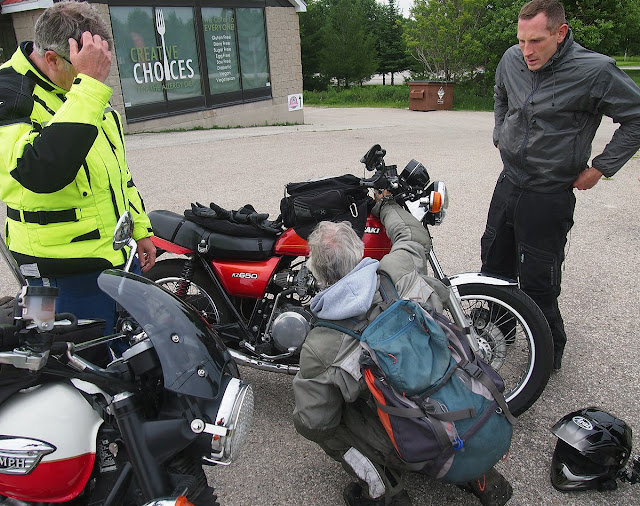 |
| We rode into the rain and then away from it as quickly as possible – but it was coming again in 30 minutes! In the meantime the cranky old Kawi worked enough to get us home. |
 |
| Not so happy in the rain (though the other 40 year old Kawi was flawless and my Connie ran like a Swiss watch). |
 |
| Scrambler pipes in the rain. |
After watching Canada’s girls’ team get kicked out of the world cup (but England won so I was still happy), we watched some Isle of Man TT, talked bikes and drank local brews. The next morning the torrential rain continued. After some hot coffee I hit the road to test my rain gear like never before, and get to the family cottage in Bobcaygeon where my wife and son were worrying about me.
I was the warm and dry centre of the universe making a Tim-on-a-Concours sized hole in the rain. Since Jeff had told me to move the petcock from “Pri” to “On” (Pri doesn’t mean the primary tank, it means prime, as in giving the engine lots of extra gas to start after being off for a long while), the Concours had developed a new smoothness with no more lumpy low RPM or gas burning backfires when I came off throttle. With the Connie running better than ever I was ready for a challenge.
 |
| The south shore of Georgian Bay in Midland. |
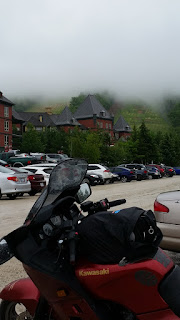 I tried to stop at Blue Mountain for breakfast where my son and I had gone ten weeks earlier on our first ride of the year, but it was a zoo. I eventually found a Tim Hortons and had some hot tea and breakfast. Pushing on from Collingwood I kept hoping I’d ride out of it, but it only came on heavier.
I tried to stop at Blue Mountain for breakfast where my son and I had gone ten weeks earlier on our first ride of the year, but it was a zoo. I eventually found a Tim Hortons and had some hot tea and breakfast. Pushing on from Collingwood I kept hoping I’d ride out of it, but it only came on heavier.
Riding in the rain is nice, everything smells fantastic and the colours are super saturated. It gets less magical when you’re doing it in heavy traffic. Drivers see you even less than they normally do and you’re dealing with spray and slick pavement as well. Many moons ago a friend of mine (an ER nurse) invented the Trotter Precipitation Index, which theorized that driver IQ is inversely proportional to the amount of precipitation falling (drivers get dumber the more it rains). I’ve generally observed this to be true, but it takes on terrifying new dimensions on a motorbike.
The slog in traffic from Collingwood to Orillia was tense and the rain had finally found a way into my rain gear, soaking my crotch. Nothing makes you crankier than a wet crotch.
I’d been on the road about three hours when I got to Orillia. I was on my way (still in heavy traffic) across the causeway on the north end of Lake Simcoe when everything stopped due to an accident. The road was closed, it was pelting down with rain and so dark street lights were kicking on. I pulled off into The Point restaurant and was saved with excellent service, hot coffee and home made soup. I looked so bedraggled that the waitress didn’t even charge me, but I left a big tip.
An hour later my core temperature was back up and I was uncramped and ready to take another run at this underwater ride. The traffic had finally cleared and the road was reopened so I crossed the causeway and headed south around the east side of Simcoe. No sooner had I saddled up than it began pelting down again. My warmed up dampness became cold and rain soaked in short order, but I was closing in on my goal.
I pulled out of the stop-start traffic on the local through road and headed toward Beaverton and some dirt bike boots I saw on Kijiji, but missed a turn in the torrential rain and ended up 10 miles down the road I needed to take to the cottage before I realized I’d missed it. I couldn’t bring myself to turn around so I pushed on toward the finish line.
The air temperature was only about 15°C and I was soaked again. Just when it looked like I had this thing in hand, and with no warning, the road was suddenly gone, replaced with deeply rutted mud and gravel. The old guy ahead of me in his new SUV was worried about getting it dirty and kept stopping (!) in the mud while he tried to figure out where to drive next. Ever tried riding a loaded Concours in ankle deep mud and ruts? It isn’t easy to keep upright, especially when you have to keep stopping and starting.
My Zen beginning to this trip was ebbing away. I was cold, sore, and tired, and I’d missed my turn and a chance to pick up some lovely Alpinestars dirtbike boots for a song. Now I was hanging on for dear life, trying to keep the big bike upright in this strange, slippery, grey mud. To top it off I was stuck in traffic that had been inflicted with the TP Index. I might have stopped but there was nowhere to do it. Cars (but mostly SUVs) were splashing around in both directions, and I was covered in mud. There were no shoulders to speak of. At this point I started to get angry. Alright, fuck this, I’m getting where I’m going instead of doubting myself. Standing on the pegs I aimed the Concours around the deepest ruts (courtesy of yahoos in cars spinning out in the start-stop traffic) and picked my way through. When you take doubt out of your riding the bike responds to your determination with a sure footedness that I found encouraging. Ten agonizing, slow and muddy kilometres later I emerged onto tarmac once again.
I might have stopped but there was nowhere to do it. Cars (but mostly SUVs) were splashing around in both directions, and I was covered in mud. There were no shoulders to speak of. At this point I started to get angry. Alright, fuck this, I’m getting where I’m going instead of doubting myself. Standing on the pegs I aimed the Concours around the deepest ruts (courtesy of yahoos in cars spinning out in the start-stop traffic) and picked my way through. When you take doubt out of your riding the bike responds to your determination with a sure footedness that I found encouraging. Ten agonizing, slow and muddy kilometres later I emerged onto tarmac once again.
As I rolled into Fenelon Falls I grabbed the brakes for a stop sign and nothing happened. The gravel they’d laid down in the construction was full of limestone dust and that grey paste had gotten into everything, especially my front brakes. I got it stopped and pulled over for a pee in the rain. By this point I was ready to pick up the bike on my back and carry it the rest of the way, some squishy brakes weren’t going to slow me down (literally or figuratively).
I saddled up again and rode through Fenelon Falls which was backed up with cottage traffic. Passing the mall some yahoo in a Mercedes SUV thought he’d suddenly pull out to get into the line of traffic inching along the other way. I hit the brakes, skidding the back tire in the never-ending rain, he saw me at the last moment and stopped. Had he hit me I’d have jumped through his windshield and beaten the shit out of him, I was pretty wound up at this point. He got a fine what-the-hell-dude gesture but didn’t want to make eye contact with the guy he almost hit so he could sit in a line of traffic.
I was finally out of Fenelon and on my way to Bobcaygeon. The bike was running on empty, but I was ok with that, I still had miles of gravel fire roads before I got into the cottage and lighter would be more manageable. I ignored the gas station in Bobcaygeon and pushed on to the cottage road with the odometer showing 236 miles since the last fill up.
The cottage road was slippery, but not like that damned construction, and it was graded properly. I was making my way down this roller coaster of a road when the bike started to chug. I was monkeying with the choke to keep it going when I remembered how low I was on gas. A quick twist of the petcock to Reserve (which got me all the way back out four days later to fill up at 248 miles on the odo) made everything happy again and I road the final couple of miles without incident.
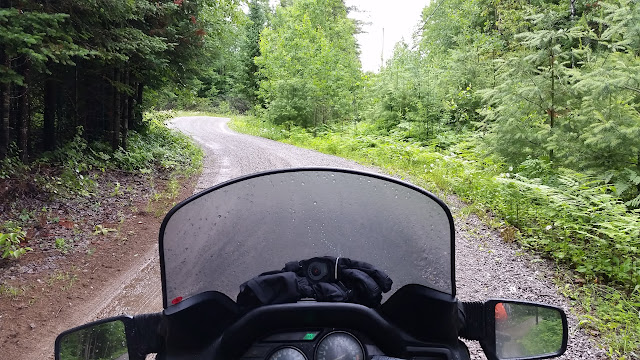 |
| The cottage road – sort of like a rally stage. The Concours was sure footed on the wet gravel. |
It was still hosing down when I pulled into the cottage garage and took off my helmet with shaking hands. Should I have stopped? Hells no! I was looking for a challenge and the weather, traffic and horrible roads had provided one. Doing a difficult thing well is its own reward, and this epic submarine riding trek becomes another unforgettable experience that I can add to my riding résumé.
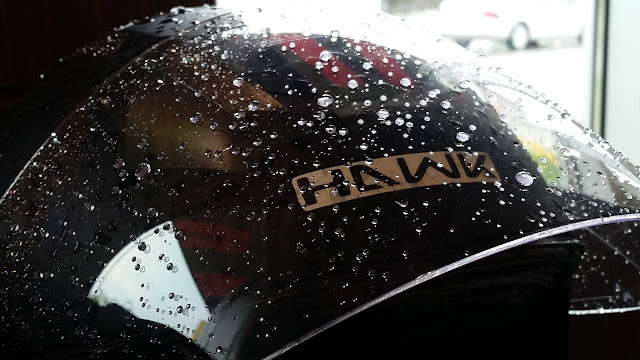 |
| Still the most comfortable (and cheapest) helmet I own. Hours in the rain it kept me dry, was virtually fog free (I waxed the visor before leaving – water beaded off), and comfortable. |
 |
| Jeff’s heated gloves, waterproof for the first couple of hours, then soaked, but warm! |
 |
| Parked in Fenelon Falls with dodgy brakes and a ‘screw-it I’m getting there’ attitude |
 |
| Mud covered but parked in the cottage garage. |
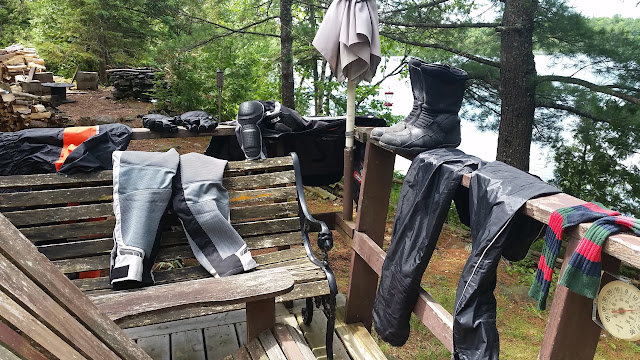 |
| The next day (sure, whatever) the sun came out and everything was steaming. It took the jacket and gloves two days to dry out. |
Last March Break I attended an industry focused future of the workplace conference in Toronto. That event aggressively underlined the importance of micro-credentials in the modern workplace. The idea of years long programs, especially in technology where changes are happening regularly, suddenly feels like a lumbering has-been rather than a vital foundation to your workplace success. The same conference caused me to examine the purpose of public education (there is much more to it than simply preparing students for work), but the gulf between school and the world beyond our classrooms continues to expand.
Since then I’ve worked with ICTC on a badging system for Focus on IT students that would allow them to micro-credential their progress through the program. Anyone involved with the scouting program will know all about analogue badges well before there were any digital ones; badging has a long history of marking progress and expertise. The military has always used badging to denote rank and expertise. More recently badging has become popular in gaming culture to show skills and achievements and this has crossed over into the real world in terms of gamification of learning in education. Badging as a form of micro-credentialing is a cultural phenomenon familiar to everyone, so micro-credentialing is nothing new.
We spent the afternoon yesterday attending the 4th annual CAN-CWiC Conference in Mississauga. For someone who has been struggling against genderized pathways in his rural high school, attending a conference with hundreds of women in digital technology was like stepping into a future we may never reach where I teach, and isn’t the case in the vast majority of Ontario digital technology classrooms.
A couple of conversations prompted by the indomitable Alanna about how some of the women at the conference got into tech were very telling. We’re both on the pathways committee at our school and the divide between high school career planning and what’s happening in the real world was shocking. While we’re busy running a system that divides students by some pretty arbitrary standards and then builds up a marks history that defines student pathways into traditional post secondary learning, the rest of the world is struggling to find life long learners, something we only pay lip service to in our schools (don’t believe me? Find out how much PD time was spent on EQAO and how much was spent on life long learning). What we view as a static, established learning schedules (one the vast majority of teachers work in very successfully), is pretty much meaningless in 2019 beyond the walls of our ivory towers.
We just did a staff survey on the last PD day and the data aligned with my anecdotal experience in secondary education. When you fill a school with university graduates, many of whom have never worked in anything other than than the academic education system as either a successful student or teacher, you end up with a very blinkered view of the where the majority of our graduates go. Academics tend to overly value their own experience and encourage students to do the same. Students are directed to follow that long academic trajectory over developing lifelong learning skills valued elsewhere. The students that do follow it are considered ‘the best’ ones.
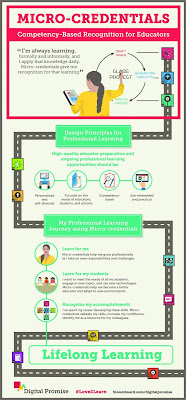 What is happening in the workplace? Digital disruption is rippling across all industry and is doing what it does, upturning traditional standards of practice and demanding agility before allegiance to tradition. In everyone we talked to at CAN-CWiC, traditional credentials were nice to have, but by no means were they the standard requirement they used to be. Industry people said that, sure, they have some post-secondary graduates in specific fields, but even in their case there was something that trumped any other credential: the willingness to adapt and learn more, even if you have a Ph.D.
What is happening in the workplace? Digital disruption is rippling across all industry and is doing what it does, upturning traditional standards of practice and demanding agility before allegiance to tradition. In everyone we talked to at CAN-CWiC, traditional credentials were nice to have, but by no means were they the standard requirement they used to be. Industry people said that, sure, they have some post-secondary graduates in specific fields, but even in their case there was something that trumped any other credential: the willingness to adapt and learn more, even if you have a Ph.D.
Danielle at IBM had a background typical of what many of our strongest female students experience. She did well in high school, and especially English, but took no tech because she wasn’t encouraged to take it – it isn’t what academic girls do. She went to the University of Guelph, ran the student newspaper, got a degree in English and then worked in radio as a writer for a couple of years until this shrinking traditional medium laid her off. She then found a ten week full time boot camp training program on full stack developing and is now a web developer with IBM Canada. She said that she greatly values her degree and time spent at Guelph and wouldn’t change any of it, but she wishes she’d had access to technology training in high school and university so she wasn’t getting into it with no experience in her twenties. Our tradition education systems plays to traditional stereotypes.
I had what I consider a feminist/woke colleague tell me about how her daughter is now taking bio-technology. I never saw her once in my computer engineering classes, but if it’s an academic girl aiming for university you’d be hard pressed to find anyone in high school telling them to take any applied technology course, even when that’s what they’re aiming at in post secondary. It’s much more important that all your classes end in a U and are in an academic situation (rows of desks) that prepare you for university. She’s now coding and is glad I put her on to Codecademy. That’s like being handed water wings when there is an olympic swim team you could have trained with in the building.
Whether talking to post-secondary education, skills training organizations or companies, the idea that we need to be able to quickly adapt in a rapidly evolving workplace probably sounds like it’s from another planet to an Ontario educator inured in our factory shift driven system. We aren’t skills focused, we’re shift focused. You might be miles ahead of what’s happening in your 3U maths class, but that’s your shift and you’re going to sit through it, for months on end. You might be miles behind in your 4U English class, but you’ll get passed along with the rest of your cohort with a mark that is pretty much meaningless. What does a 60% in 4U English do for you? What does a 100% in 3U math mean? It keeps you with your cohort and does very little in terms actual learning. We’re all held prisoner by our 19th Century education production line schedule that churns out grades. Every time the bell goes off to signal a shift change I wonder what year I’m in. But considering how difficult it is to timetable a grossly simplistic, generalized curriculum, I shudder to think what would happen if the system actually did need to schedule itself around individual student need.
Does this mean the end of traditional, years long learning programs? No, specialists still need that depth of training, but for many these years long, financially crippling programs aren’t leading to a job, so we have to change that expectation. I had a student last year who struggled in traditional classrooms but had good hands. He went to college because that’s what everyone expected him to do but dropped out in the first semester due to a lack of maths fundamentals (he probably got passed through everything with a 60% – gotta keep ’em with their cohorts!). My suggestion before and after all that was to start knocking out industry ICT qualifications and gaining experience in the workplace. Demonstration of your willingness to learn and evidence showing that you have a good work ethic will take you where a college diploma won’t. ICT is still a pretty new industry, so it doesn’t have the embedded, historically recognized apprenticeship pathways that other technology pathways do, but it should. Apprenticeship training with its mentored, skills focused, individualized learning is what the majority of applied training should be modelled around, but that system is foreign to all the Bachelor carrying people doing the teaching.
 |
| Nice eh? One of only a handful of people in Canada with this qualification, but it doesn’t count in our academics-only education system. |
After my degree I went to work in ICT and ended up getting my qualifications as a technician. Those were micro-credential bootcamp style courses I was taking way back in 2000. I AQ’d (AQs are micro-credentials) frequently when I started teaching and recently did two more ICT qualifications just to stay current and give my students access to material. OCT is very stingy around what it shows in teachers qualifications – mine shows only academic qualifications, but none of the technical qualifications including my apprenticeship because they are “less than” in our academically focused education system. Teacher training only matters if a university had a hand in it. Ironically, my board paid me nothing for my technical upgrading, even though it directly serves my students (thankfully my union did help me cover it).
Micro-credentialing is the new normal in the world beyond our school walls. A big degree or diploma also shows your willingness to learn, but if it’s all you’ve got in 15 years on the job, then most companies will ignore you. If you think it’s your passport to a good paying job, you’ll find yourself stuck in customs. Micro-credentialing shows an employer that you’re always willing to upgrade your learning and stay relevant in a changeable workplace. What they’re looking for is life long learners, not a one trick pony with a single degree or diploma from years ago, no matter what your grades. Aiming for an outcome like that (earn my degree and I’m set) is aiming for failure in 2019, no matter what grades you’re getting and how excited guidance counsellors are about your opportunities. If we were focusing our students on developing the confidence needed to always be open to learning something new, and the hunger and resiliency needed to leap into learning opportunities, they’d be in the right mindset to survive in the 21st Century workplace. Dragging unwilling kids through months of instruction isn’t doing that.
 What this has done for me is underline all the extracurricular training and competition work we do in our program. All of those awards and the effort that goes into them highlights that go-the-extra-mile lifelong-learning skills that are so in demand in the world. That these efforts aren’t integrated into our curriculum is yet another failure of our marks based, traditional model.
What this has done for me is underline all the extracurricular training and competition work we do in our program. All of those awards and the effort that goes into them highlights that go-the-extra-mile lifelong-learning skills that are so in demand in the world. That these efforts aren’t integrated into our curriculum is yet another failure of our marks based, traditional model.
Maybe in the future Ontario classrooms we’ll begin to break down our schedules into micro-credentials. Students aiming at current and emerging technologies could take quickly updated, personalized, micro-credentials that focus them on the specific skills they need without months long classes. Traditional subjects like English could be broken down into their fundamental components. While everyone would need to take the literacy strand, not everyone needs to take the historical literature piece. What would our maths and sciences classes look like if students were working on particular, skills based micro credentials rather than grinding through months long, generalized curriculum aimed at a mythical average student? Digital disruption has produced differentiated production lines focused on more high value, bespoke products. Education could follow the same evolution and begin using ICT to differentiate student scheduling and specify learning so that it wasn’t locked into a pedantic and ineffective 19th Century model.
In 2011 I imagined a fictional account of what a system designed around student differentiation rather than enabling our traditional model would look like. The divide between what’s happening in our classrooms and the digitally disrupted workplace our students are graduating into has never been wider. If the various stakeholders in the education system can rejig the system while maintaining the highest standards (this isn’t about cheaper, it’s about greater flexibility in service of our students), then it needs to happen yesterday – we’re falling further and further out of relevance for too many of our students.
from Blogger https://ift.tt/2X5iUsn
via IFTTT
 |
| The Concours, not nearly so precious with its kintsugi gold filled cracks… |
Another idyllic night ride home this evening. On the way in I saw an older Honda on the side of the road with a for-sale sign on it, so I made a point of stopping on the way home in the dark to have a look.
It’s a 1974 Honda XL175. It looks like the owner is asking almost two thousand dollars for it, which seems a bit precious. I suppose this is officially a classic now, and with nostalgic Boomers wrestling with Hipsters to snap them up, a couple of grand may very well be possible. It has less than three thousand miles on it and looks like it’s been well loved.
I think I’ll save my money for something a bit less ‘just so’. I’m not interested in getting a dual sport bike so I can rub it with a diaper. Having said that, Mars Orange sure is a striking colour!
 |
| For a 1974 (41 year old!) motorbike, it’s obviously led a charmed life. If you’re suddenly in love, you can find it here |
Snow storms and freezing temperatures, but I managed to squeeze a quick ride up and down the river on Sunday afternoon just before it was back to work time.
| I am here to steal Firefox! |
| Snow in the gullies… |
| That’s a quality Ontario paved road |
Everything on here came off the 360Fly4k camera.
Stills pulled off the 360Fly Director software.
The video was just dumped onto Youtube because the Director software won’t render video. Quite frustrating… they need an update. When you run the point of view video editor it just doesn’t seem to pick up the rendering thread.
from Blogger http://ift.tt/2mrpdHI
via IFTTT

Here we are at the beginning of 2012. Our board is having a learning fair at the end of the summer (9 short months away) and they are looking at 21st Century learning and technology as a focus.
My suggestion is three years of time travel. It doesn’t sound like much, but at the current rate of change, we’re stretching the boundaries of reasonable speculation pushing even three years out. What will our class rooms look like in 2015, if we moved with the technology? Looking back might give us a clear idea of how little we may be able to guess!
The economy was on its knees, a radical new voice was about to be sworn in south of the border, and gas prices were about to leap and then leap even higher; peak oil panics abounded. BRIC countries were in huge growth while the old democracies fed their young to capitalist bandits.
Three years ago, Facebook was in its massive growth phase and wasn’t a habit so much as a new sensation. Tablets were an in-joke on the Simpsons from the ’90s, and Apple was still a year away from getting it right with the first ipad. There was no tablet market as such.
Netbooks (net what?) were the new and exciting technology craze, what everyone thought would make personal computing affordable, portable and available to everyone. An obvious way to keep tech moving forward as the entire banking system fell into disrepute.
Smartphones were still half screens with keyboards, and ruled by RIM. An exciting new phone by a company called “Palm” was the buzz at CES2009 and Microsoft evidently once made a Mobile Windows OS for phones! The first iphone was a year old, stratospherically priced, attached to a single provider and had a new app store with no apps. Android wasn’t even a glimmer in Google’s eye.
In 2009 our school was in the process of installing wireless internet, but it was still a year away from being stable enough to use (and is still a poor second place due to bandwidth issues). Everyone in the school used a single core, IBM/Lenovo, board desktop etherneted to the wall, if they used one at all. Less than 1 in 100 students brought their own laptops to class (though more and more were beginning to bring netbooks, though they couldn’t use them online because they weren’t allowed to plug in to the ethernet).
Walking in to an old-school, centralized IT environment did not seem so silly in 2009. The network ran on board owned machines in a closed system. Other than email, cloud based storage was unheard of. It was a long three years developing UGDSB’s Google Cloud project; it was non-existent in 2009.
Things have zigged and zagged in surprising directions. Game changers like ipad and Android and the abject failure of the biggest technical buzz item of 2009 (those netbooks) show that there are some changes that sweep through our digital ecosystem so quickly that they are impossible to foretell.
Having said all that, I’ve been hammering away at ideal directions in Bring Your Own Device (BYOD) and multiple ecosystem technical learning environments for months now, and think I might be able to take a viable stab at it.
I only hope my colleagues are willing to jump into mix with me. We could contribute to yet another real step forward in our board’s technical evolution:

Mini-lab: the decentralized Education Lab
The Future of Media Arts Labs
Future School
IBM’s 5in5 (great example of shocking changes that are probable)
Digital Skills Continuum (still not a thing years later)
Fourteen months into Dusty World and I’m approaching 5000 views, which is exciting.

When I started blogging after ECOO 2010, I did some reading about just how to do it. A couple of suggestions have borne up well after fourteen months of blogging, but they aren’t your typical how-to-drive-page-views blog advice.
/WARNING
This isn’t a how-to-make-a-successful-business-blog type post. There are piles of how to become a pro-blogger advice columns out there; this isn’t that. I didn’t start blogging to make money or win fame. If you’re looking for a how to monetize your blog and push traffic type thing, then I’d argue that you’re a shallow git who doesn’t get what this really is. Blogging isn’t supposed to replace traditional media with a new way for a few people to target, market and sell to many, blogging is democratized publication. Old, industrialized media is dying. This isn’t a bad thing, stop trying to be like them.
/WARNING OFF
To that end, I found a piece of advice early that has allowed me to keep blogging regardless; always write about what you want, the way you want. This works for me in a couple of different ways. The main reason I’m still at it over a year later is that I find writing about problems, solutions and challenges in technology and teaching to be cathartic. Blogging gives me perspective, sometimes it prompts responses that help me see a way through, and ultimately allows me to be better at what I do. These are all ends in themselves; reason enough to blog right there.
I also never feel like this is work, more like therapy. I know I’ll probably feel better after blogging, so tend to want to do it. I’ve found that blogging tends to result in a very direct style of writing that clarifies thoughts and my feelings on issues (you can’t go on and on in a blog, it’s the wrong format).
I don’t shy away from a philosophical approach because I’m representing my peeps. I am what I am and write what I write, I wouldn’t expect everyone to read it, I wouldn’t want them to. I’m aiming at a specific reader (thoughtful, educationally and digitally curious), and I’m fine with that. If I wanted page views I’d write college humor blog entries (but that would be work).
Another suggestion I read was write often (and don’t forget to label your entries so people can find them). Once you’ve built up a library of entries, the views will find you. This has been the case. Looking at the stats, there is always a bump on a new post, but the archive gets more hits now than even the new-entry bump. Keep writing, eventually you’ll build up enough content on enough subjects that people will find you. Your entries get shared, and shared again, you start to see views from all around the world (which makes me wonder just how Canadian-centric my thinking may appear), and before you know it, there are many avenues to your blog, not just you pushing it out on your social networks.
Publishing your writing puts it out there. It makes you want to put your best ideas forward. I proof my entries, and try and make them technically correct because I never know who might end up reading them. Diary or journal writing for yourself doesn’t drive you in that direction, that’s a different sort of therapy.
As an English teacher, I feel like blogging makes me a better writer and gives students a chance to see how I do what I’m expecting them to do. So many English teachers don’t write, or don’t offer students access to their writing… it strikes me as a bit hypocritical.
In the meantime, I find myself, a digitally skilled student of philosophy and history, living at a pivotal moment in human history; the birth of a digital revolution that will rock the world in much the same way (and much more quickly) than the industrial revolution did in the past two hundred years. The world is changing in ways we can’t even begin to foresee, and I’m teaching in it!
It’s an exciting time to pick a timely new medium and enjoy using it. Blog well my friends.
Originally published on Dusty World in April, 2016: https://temkblog.blogspot.com/2016/04/deep-learning-ai-future-of-work.html
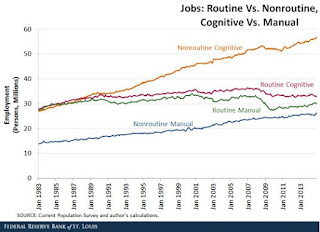 |
| Most jobs have tedium as a prerequisite. No one does tedium better than a machine, but we still demand that kind of work for humans… to give them self worth? |
This isn’t the first time our compulsive urge to assign monetary value to survival has struck me as strange. This time it was prompted by an article on deep learning AI and how machines are close to resolving many jobs that are currently reserved for human beings (so that they can feel relevant). We like to think employment is what makes us worthwhile, but it really isn’t, and hasn’t been for a long time.
The graph above is from that article and it highlights how repetitive jobs are in recession as machines more effectively take over those roles. As educators this leaves us in a tricky situation because we oversee an education system modelled on factory routines that is designed to fit students into repetitive labour (cognitive for the ‘smart’ office bound kids, manual for the other ones).
How can an education system modelled on Taylorist principles produce students able to succeed in the Twenty-First Century? It can’t, because it can’t even imagine the world those students are going to live in. There is a lot of push back in educational theory around the systemic nature of school administration, but I see little movement from management other than lip service. Educational stakeholders from unions to ministries and even parents like our conservative education system just the way it is.
| Between neuroscience and freeing ourselves of academic prejudices (ie: creativity happens in art class), we could be amplifying what human beings are best at instead of stifling it. (from Newsweek) |
In the meantime, people who are taught to sit in rows, do what they’re told and hit clearly defined goals are becoming increasingly irrelevant. We have machines that do those very things better than any human can, and they’ll only be doing more of it in the future.
Ironically, just at the time where human beings might have technically developed a way out of having to justify their survival all the time they are also crippling their ability to do what humans do best. In recent years creativity,as critically assessed in children, is diminishing. The one thing we are able to do better than machines is being systemically beaten out of us by outmoded education systems and machines that cognitively infect us with their own shortcomings!
Machines offer us powerful tools for a wide variety of tasks. I use digital technology to express my interest in the natural world, publish, and learn, but for the vast majority of people digital technology is an amplifier of bad habits and ignorance. Many people use the personalization possible in digital technology to amplify their own prejudices, juice their brains like Pavlovian dogs in empty games, and all while living in a cocoon of smug self justification.
Just when we’re able to leverage machines to free human beings from the tedium of working for a living, those same machines are shaping people to be as lazy, directionless and self assured as they wish.
In the meantime the education system keeps churning out widget people designed for a century ago and the digital attention economy turns their mental acuity into a commodity.
Rise of the machines indeed.
How best to drive south out of the snow and salt? A limo styled Benz! They’re asking about forty-seven grand for it out of a place in Toronto, and it has almost no miles on it. The Metris gets the highest reviews in terms of work vans, and this one has been blinged up to make it a comfortable mile muncher.
How disco is it? Built in TV, tall roof and power everything. It’ll easily swallow the Tiger along with the family and then make for a comfortable and pretty thrifty ride.
A good first escape out of the snow would be Louisiana over the new years. It’s two thousand kilometres and twenty hours south. With a stop between Louisville and Nashville, we’d be in the Mississippi Delta in two days, then the bike can come out the back and I’d have a couple of days discovering the roads of the lowlands at a time of year when I’m as far from two wheels as I ever get.
Mississippi Loop: From the Gulfport coast up the shores of the Mississippi before looping back around. 355 miles all in:
Louisiana South: Through New Orleans and to the ends of the Delta. 436 miles:
How I found those routes: http://www.motorcycleroads.com/Routes/Louisiana_94.html
Two days down, two days on the bike, two days hanging out in New Orleans and then a couple of days back means we could squeeze this all in before going back to work.
Leave Friday, Dec 28th and get back home Saturday, Jan 5th.
from Blogger http://bit.ly/2Q7AOWi
via IFTTT